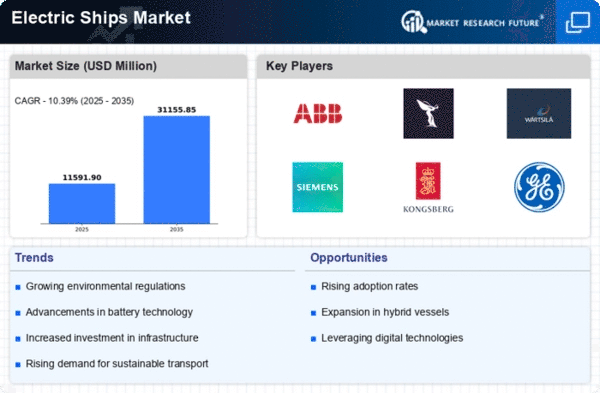Market Share
Electric Ships Market Share Analysis
The global movement towards eco-friendly and sustainable solutions is causing a transformational shift in the Electric Ships market. Share positioning techniques are essential in this ever-changing environment for businesses looking to become the market leaders regarding the electrification in the marine sector. The electric ships market's competitive dynamics are being shaped by a number of important strategies. Differentiating one's technology is one such tactic. Businesses are making significant investments in the creation and application of cutting-edge energy storage systems, smart navigation technology, and electric propulsion systems. These businesses establish themselves as pioneers in technological innovation by providing dependable and state-of-the-art electric propulsion alternatives. This attracts environmentally conscious shipowners who want to update their fleets while lowering their carbon impact. Well addition to being a market share strategy, this emphasis on technological innovation fits well with the larger industry trend towards environmentally friendly and effective maritime transportation. Partnerships and collaboration are growing more prevalent in the market for electric ships. Companies are establishing strategic alliances with producers of electric components, suppliers of batteries, and research institutions due to the complexity of electrical propulsion systems and the requirement for a wide range of skills. Through these partnerships, businesses may pool resources, take advantage of complementary skills, and quicken the advancement of electric ship innovations. Companies may improve their market share standing and jointly push the widespread use of electric propulsion systems in the maritime industry by putting up a united front and combining resources.
Leading companies in the market are also giving compliance with regulations and certification a lot of attention. Businesses that aggressively adhere to and surpass environmental standards portray themselves to be accountable and forward-thinking, especially as the marine industry comes under growing scrutiny and legislation aimed at lowering greenhouse gas emissions. Acquiring environmental efficiency and security certifications improves a business's standing and credibility with regulators as well as clients. In addition to securing the current market share, this dedication to compliance creates new prospects as organizations and governments place a high priority on sustainable shipping methods.
In the electric ships industry, customer awareness and education initiatives are yet another essential component of market share positioning. It's possible that a large number of prospective clients are ignorant of the advantages and possibilities of electric power for maritime applications. Ship owners looking to make well-informed fleet investment decisions may be drawn to companies that fund instructional programs that highlight the long-term price savings, lower impact on the environment, and operational benefits of electric ships. Increasing awareness helps a business become more visible in the market and establishes it as an authority in the quickly developing field of electric marine transportation.
Furthermore, effective market share positioning requires both flexibility and capacity for growth in product offers. Businesses are better positioned to take up a varied market share if they can customize their electric propulsion options to fit different vessel types and dimensions, from little ferries to enormous container ships. The capacity to offer scalable solutions guarantees that businesses can satisfy the unique requirements of a broad spectrum of clients, enhancing their competitiveness and expanding their market share.
In conclusion, environmental concerns and legislative changes are driving a boom in demand for electric ships. To position themselves attractively, market leaders are implementing methods like technological distinction, collaboration, regulatory compliance, consumer education, and scalable product offers. Businesses that adeptly manage these tactics will probably take a sizable chunk of the developing Electric Ships market as the marine sector continues its shift to sustainable practices.


















Leave a Comment